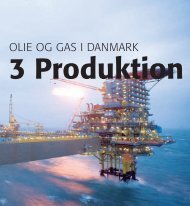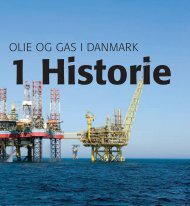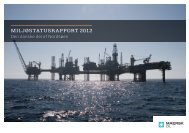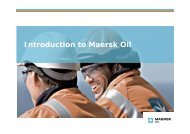Environmental statement - Flyndre and Cawdor - Maersk Oil
Environmental statement - Flyndre and Cawdor - Maersk Oil
Environmental statement - Flyndre and Cawdor - Maersk Oil
Create successful ePaper yourself
Turn your PDF publications into a flip-book with our unique Google optimized e-Paper software.
<strong>Flyndre</strong> <strong>and</strong> <strong>Cawdor</strong> <strong>Environmental</strong> Statement<br />
Section 2 Proposed Development<br />
2.11.2. DISCHARGES TO SEA<br />
OIL POLLUTION PREVENTION AND CONTROL (OPPC) (PERMIT REFERENCE: L00076)<br />
The Clyde platform has a permit for the discharge of produced water in accordance with the<br />
Petroleum Activities (<strong>Oil</strong> Pollution Prevention <strong>and</strong> Control) Regulations (OPPC) 2005(<strong>and</strong> amendments<br />
2011). It is anticipated that there will be an increase in the total volumes of produced water <strong>and</strong> oil<br />
discharged <strong>and</strong> therefore an amendment to the OPPC permit will be applied for as required.<br />
CHEMICAL USE (PERMIT REFERENCE PON15D/229)<br />
The relevant permits to use <strong>and</strong> discharge chemicals offshore will be amended in accordance with the<br />
Offshore Chemical Regulations 2002 (variation to the PON15D). All offshore activities are covered by<br />
the Regulations including oil <strong>and</strong> gas production, drilling of wells, discharges from pipelines <strong>and</strong><br />
discharges made during decommissioning. Following on from a review of chemicals required a<br />
variation to the PON15D ‐229 will be made.<br />
2.12. DECOMMISSIONING<br />
At cessation of production, the wells, subsea structures <strong>and</strong> associated production facilities will be<br />
decommissioned in accordance with statutory requirements in force at that time.<br />
There are a variety of environmental effects relating to decommissioning the subsea infrastructure<br />
<strong>and</strong> pipelines. These include emissions to air <strong>and</strong> water, waste disposal, energy use, onshore disposal<br />
<strong>and</strong> recycling. The nature <strong>and</strong> extent of the potential environmental effects is dependent on the<br />
decommissioning strategy selected.<br />
It is outside the scope of this ES to present a detailed assessment of the decommissioning options. As<br />
an integral component of the decommissioning process, <strong>Maersk</strong> <strong>Oil</strong> will undertake a study to<br />
comparatively assess the technical, cost, health, safety <strong>and</strong> environmental aspects of<br />
decommissioning options, for which a further <strong>Environmental</strong> Impact Assessment will be required at<br />
that time.<br />
Detailed decommissioning plans will be submitted to the DECC for the decommissioning of the<br />
<strong>Flyndre</strong> <strong>and</strong> <strong>Cawdor</strong> development at the appropriate time, dependent on the COP <strong>and</strong> the end of field<br />
life. The date of cessation of production <strong>and</strong> the commencement of decommissioning of associated<br />
facilities will depend upon field performance, field economics, the production of other fields tied back<br />
to the Clyde platform <strong>and</strong> associated operating costs.<br />
The Marine <strong>and</strong> Coastal Access Act (MCAA) came into force in November 2009. The Act covers all UK<br />
waters except Scottish internal <strong>and</strong> territorial waters which are covered by the Marine (Scotl<strong>and</strong>) Act<br />
2010 which mirrors the MCAA powers. The licensing provisions in relation to MCAA came into force<br />
on 1 st April 2011.<br />
MCAA will replace <strong>and</strong> merge the requirements of FEPA Part II (environment) <strong>and</strong> the Coastal<br />
Protection Act (navigation). Although some oil <strong>and</strong> gas exploration <strong>and</strong> production activities are<br />
exempt from MCAA, some decommissioning activities do require an MCAA license, including:<br />
removal of substances or articles from the seabed<br />
disturbance of the seabed (e.g. localised dredging to enable cutting <strong>and</strong> lifting operations)<br />
deposit <strong>and</strong> use of explosives that cannot be covered under an application for a Direction.<br />
disturbance of the seabed e.g. disturbance of sediments or cuttings pile by water jetting<br />
during ab<strong>and</strong>onment operations.<br />
D/4114/2011 2‐27








